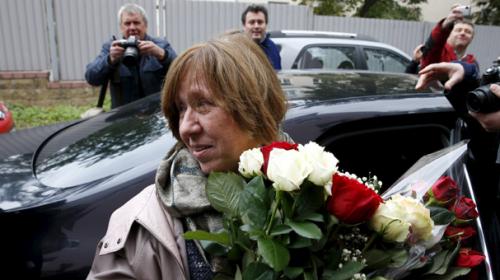Nobel Literature winner says loves Russia but not the one of ‘Stalin and Putin’
MINSK: Belarusian writer Svetlana Alexievich said Thursday she was dedicating her Nobel prize for literature to her homeland -- where her books cannot be published -- blasting strongman rule there...
October 08, 2015

Apparently caught by surprise by the news in her tiny Minsk flat, Alexievich hastily called a press conference at the offices of a local newspaper.
"It´s a great personal joy," she said, saying she was humbled to have joined the ranks of Russian Nobel-winning greats Ivan Bunin and Boris Pasternak.
"It´s not an award for me but for our culture, for our small country, which has been caught in a grinder throughout history," she said.
Alexievich, who writes in Russian and has railed against the soul-sapping Soviet system in her books, slammed authoritarianism in Russia under President Vladimir Putin.
"I love the Russian world, but the kind, humane Russian world," she said. "I do not love Beria, Stalin, Putin... how low they let Russia sink," she said, referring to the former Soviet leader and his head of the secret police.
Alexievich said she has been ignored by her country´s authorities under strongman leader Alexander Lukashenko, whom she has criticised strongly.
"They pretend I don´t exist," she said. "I am not published (in Belarus) and I cannot speak publicly anywhere.”
Alexievich said she has been turned off by Moscow´s aggressive, militaristic rhetoric and policies, including its meddling in Ukraine and the idea that "everything can be solved from the position of force."
Speaking in a crowded room after being presented with flowers amid cries of "Hurrah!", she said she was sad that most of the people she wrote about in her books chronicling the Chernobyl disaster and World War II died before she won the award.
"I thought -- how sad that they will never know," she said of the female WWII soldiers of her book "War´s Unwomanly Face" and the emergency workers who sacrificed themselves after the nuclear catastrophe whose stories she recorded in "Voices from Chernobyl".
Given that her work focuses on stories that the Soviet authorities often sought to censor or forget, she said it has been difficult to keep working but the Nobel has raised her spirits.
"In our time it is difficult to be an honest person," she said. "There is no need to give in to the compromise that totalitarian regimes always count on."









